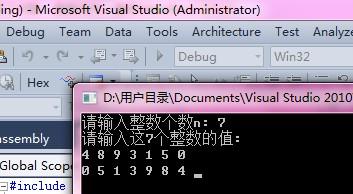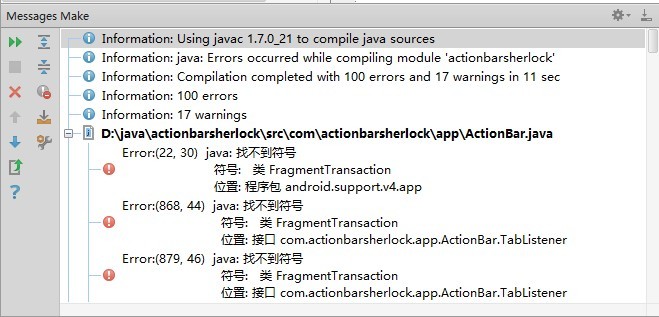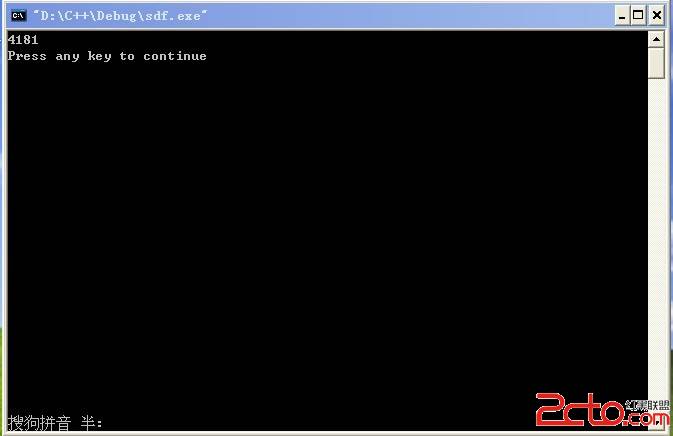c标准函数库--->assert.h
assert.h是C标准函数库中的头文件。其中定义了assert()宏用于程序调试。
在C标准函数库中,它是个非常特别的头文件,你可以将它引入数次以获得不同的效果,此效果依引入时是否以定义NDEBUG而定。
宏
assert()是一个诊断宏,用于动态辨识程序的逻辑错误条件。其原型是: void assert( int expression);
如果宏的参数求值结果为非零值,则不做任何操作(no action);如果是零值,用宽字符(wide characters)打印诊断消息,然后调用abort()。诊断消息包括:
源文件名字 (在stdlib.h中声明的宏__FILE__的值)
所在的源文件的行号(在stdlib.h中声明的宏__LINE__的值)
所在的函数名 (在stdlib.h中声明的宏__func__的值),这是 C99新增的特性
求值结果为0的表达式
诊断信息的显示目标依赖与被调用程序的类型。如果是控制台程序,诊断信息显示在stderr设备;如果是基于窗口的程序,assert()产生一个Windows MessageBox来显示诊断信息。
程序可以屏蔽掉所有的assert()而无需修改源代码。这只需要在命令行调用C语言的编译器时添加宏定义的命令行选项,定义DNDEBUG宏;也可以在源程序程序引入<assert.h>之前就使用#define NDEBUG来定义宏。被屏蔽的assert()甚至不对传递给它的参数表达式求值,因此使用assert()时其参数表达式不能有副作用(side-effects).
例程:
[cpp]
#include <stdio.h>
#include <assert.h>
int main (void)
{
FILE *fd;
fd = fopen ("/home/user/file.txt", "r");
assert (fd);
fclose (fd);
return 0;
}
例程:
[cpp]
//没有定义NDEBUG
#include<stdio.h>
#include<stdlib.h>
#include<assert.h>
int main()
{
printf("1 ok hello \n");
assert(1==4);
printf("2 ok exit \n");
return 0;
}
[cpp]
结果:
**************************************************************************************************
1 ok hello
assert_h_ex_nodebug: assert_h_ex.c:7: main: Assertion `1==4' failed.
已放弃
**************************************************************************************************
[cpp]
//定义NDEBUG
#include<stdio.h>
#include<stdlib.h>
#define NDEBUG
#include<assert.h>
int main()
{
printf("1 ok hello \n");
assert(1==4);;
printf("2 ok exit \n");
return 0;
}
[cpp]
结果:
********************************************************************************************************************************
1 ok hello
2 ok exit
********************************************************************************************************************************
[cpp]
原理:
#define assert(test) if(!(test))\
fprintf(stderr,"the failed : %s file %s ,line %i\n",#test, __FILE__,__LINE__);\
abort();
[cpp]
模拟:
#include<stdio.h>
#include<stdlib.h>
//#define NDEBUG
//#include<assert.h>
#define Assert(test) if(!(test)) fprintf(stderr,"Assertion failed: %s, file %s, line %i\n", #test, __FILE__, __LINE__);abort()
int main()
{
printf("1 ok hello \n");
Assert(1==4);
printf("2 ok exit \n");
return 0;
}
[cpp]
结果:
*************************************************************************************************
1 ok hello
Assertion failed: 1==4, file assert_h_ex.c, line 9
已放弃
**************************************************************************************************
补充:软件开发 , C语言 ,




